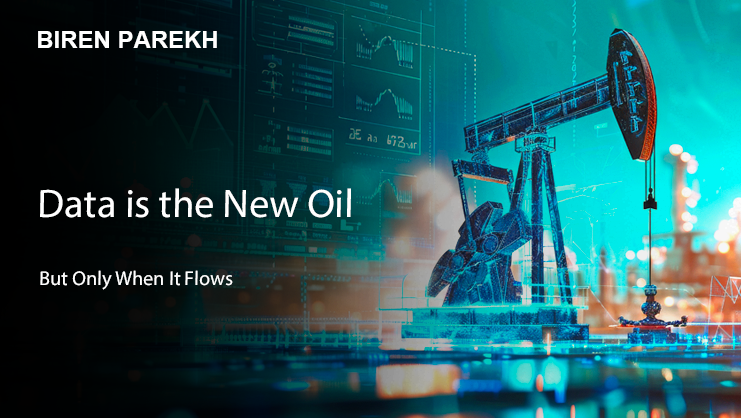Data is the New Oil – But Only When It Flows
We live in a world where data is often called “the new oil.” It’s a metaphor that captures the enormous potential locked inside the information we create every second. Just as oil powered the industrial age, data is the fuel of today’s digital economy. But here’s the catch, just as crude oil is useless until it’s extracted, refined and distributed, data too only holds value when it moves with purpose.
In fact, hoarding data or letting it sit idle is like drilling oil wells and never refining the crude potential without progress. Data that leaks can be more damaging than a literal oil spill, eroding trust and leaving scars that take years to repair. And data stored in silos, inaccessible and unused, eventually evaporates outdated, irrelevant and forgotten.
The future will not belong to those who just collect data. It will belong to those who know how to make it flow securely, ethically and meaningfully.
Why the “Data = Oil” Analogy Still Resonates
When oil was discovered and harnessed in the 19th century, it sparked an energy revolution. Industries flourished, new modes of transportation emerged, and nations competed fiercely for control of this resource. Oil didn’t just power factories and vehicles; it powered entire economies.
Today, data is playing a similar role. Every digital transaction, every customer interaction, every device connected to the Internet of Things (IoT) produces data. Businesses, governments, and individuals are all sitting on digital oil fields. But without pipelines, refineries, and systems of distribution, it has no value.
The analogy is powerful because it emphasizes the journey:
- Extraction: Collecting data from multiple sources.
- Refinement: Cleaning, structuring, and analyzing raw data.
- Distribution: Sharing insights with the right people, systems, or applications at the right time.
- Usage: Turning refined data into decisions, innovation, and value creation.
Just as oil required refineries and tankers, data requires infrastructure like cloud platforms, APIs, AI systems and governance frameworks.
When Data Stagnates – The Cost of Hoarding
Many organizations today fall into the trap of hoarding. They collect massive amounts of data, hoping that someday it will prove useful. But without proper systems to analyze and apply it, data becomes a liability rather than an asset.
Stagnant data:
- Gathers “digital dust” : Stored but never used, taking up space and resources.
- Misses opportunities : Insights that could have been generated in real-time lose relevance later.
- Becomes obsolete : Outdated customer records, old transaction logs, or expired market insights are of little value in a fast-moving world.
Think about a retailer that collects customer data but doesn’t analyze purchase patterns or preferences. The data exists, but the company loses out to competitors who do use similar insights to personalize offers, optimize supply chains and improve customer experiences.
Data locked away is wasted, data in motion is what drives progress
When Data Leaks – Trust is Hard to Repair
Just as an oil spill devastates ecosystems, a data leak can devastate trust. Data breaches expose sensitive information, financial records, personal details, intellectual property, and the consequences are often irreversible.
- Customer trust erodes: Once people feel their data is unsafe, they hesitate to engage.
- Reputations suffer: A single breach can overshadow years of brand-building.
- Legal costs rise: Compliance with privacy regulations like GDPR and CCPA comes with heavy penalties for leaks.
Consider the high-profile breaches in recent years, from financial institutions to social media platforms. The immediate costs run into millions, but the long-term damage to credibility is far greater.
Data must flow, yes, but like oil pipelines, it must be protected. The challenge is not just moving data but moving it securely.
When Data Evaporates – The Silence of Siloed Information
Data silos are another silent killer of value. In many organizations, data is trapped in different departments or systems that don’t communicate. Marketing has one set of insights, sales another, operations yet another.
When data remains disconnected –
- Collaboration weakens: Teams work with partial pictures, missing the big picture.
- Innovation stalls: Breakthroughs often happen when insights from different domains intersect.
- Data gets lost: Old systems, unintegrated tools and poor data governance cause information to “evaporate.”
Imagine a hospital where patient data is locked separately in radiology, labs, and outpatient clinics. Doctors can’t see a complete medical history, leading to inefficiencies, duplication and even risks to patient safety.
Breaking silos and enabling flow across systems is not a technical upgrade; it’s a business necessity.
The True Value – When Data Flows
When oil flows, it powers engines. When data flows, it powers innovation. Flow means connecting, analyzing, and applying data in real-time, across boundaries, to create measurable value.
Here’s what flowing data can do –
- Fuel Smarter Services
Personalized recommendations on e-commerce platforms, intelligent routing in ride-sharing apps, and real-time fraud detection in banking are all powered by flowing data. - Empower People
Employees equipped with dashboards and insights make better decisions. Customers who can see and control their data feel empowered rather than exploited. - Enable Innovation
Data flows enable AI models, predictive analytics, and automation, unlocking entirely new business models and opportunities. - Strengthen Trust
Transparent, ethical, and secure data flows reassures stakeholders that value is created without exploitation or harm.
Secure, Ethical, Purposeful Flow – The Future of Data
So, how do organizations transition from hoarding and leaking data to flowing data with purpose? The answer lies in three pillars:
- Secure Flow
Invest in cybersecurity, encryption, access controls and compliance frameworks. Data pipelines should be as secure as oil pipelines, with no room for leakage. - Ethical Flow
Respect privacy. Obtain consent. Use data in ways that align with customer expectations and regulatory standards. Ethics is not just compliance; it’s a competitive advantage in an age where trust is currency. - Purposeful Flow
Not all data needs to move. Data should flow with intent, serving business goals, customer needs, or societal good. Purpose creates focus and prevents waste.
Conclusion: Don’t Just Own Data, Make It Move
The metaphor of oil reminds us of the tremendous potential that data holds, but also of the risks that arise when it is mishandled. Oil sitting underground is just sludge. Oil spilled in oceans is a disaster. Oil burned without care pollutes. Only when it is refined and directed does it create progress.
The future belongs not to organizations that merely possess vast stores of data, but to those who know how to move it securely, ethically and with purpose. Companies that understand flow will build smarter services, earn deeper trust and lead innovation in the digital economy.
So next time you hear “data is the new oil” remember the hidden truth: its value doesn’t come from ownership. It comes from movement. Because data, like oil, is only powerful when it flows.






